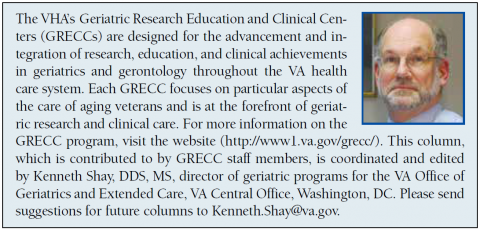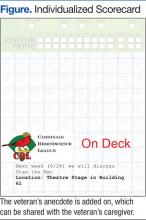The number of older veterans with dementia and depression has posed a growing health care concern. Before its 2012 closure, the Geriatric Research Education and Clinical Center (GRECC) at the VA St. Louis Health Care System (VASLHCS) in Missouri addressed this concern by creating a baseball reminiscence group pilot study to provide social support for veterans with dementia and depression.
Related: Development and Evaluation of a Geriatric Mood Management Program
Reminiscence therapy improves self-esteem, enhances mood, and promotes communication skills. Reminiscence therapy stimulates participants to share memories, which is helpful in relieving depressive symptoms and has shown positive effects on cognition.1,2
Dementia Management
In 2010, 563,758 veterans were diagnosed with dementia, including Alzheimer disease (AD).3 Although pharmacologic management of AD may slow its progression, AD cannot be prevented or reversed, and the treatments may cause adverse effects.4 Therefore, participation in support groups and supportive services should also be explored.
Currently, 70% of individuals with AD live at home, and most would like to remain there. Family caregivers provide 80% of the care in the home. Depending on the value placed on informal home care, the annual cost per patient for dementia care can be estimated between $41,689 and $56,290.5 The financial burden on family caregivers as well as on the veterans with dementia is increasing and needs to be addressed to improve the quality of care. Support groups may improve the quality of life (QOL) and care for both veterans and their caregivers.
Group Characteristics
Hoping to expand treatment options that would positively impact veterans, the VASLHCS GRECC created a reminiscence support group with the goal of improving the QOL for veterans with a diagnosis of dementia and depression. The group was modeled after the football reminiscence project of Scotland.6
Men and women with an interest in baseball and a diagnosis of either depression or dementia were invited. The presence of a family caregiver improved the probability of the veteran joining the group.
Related: Home-Based Video Telehealth for Veterans With Dementia
Ten of the original 14 recruits finished the first year with the group; 2 dropped out, 1 died, and 1 could not find transportation to the meetings. Of the 10 participating veterans, 3 had a depression diagnosis (Geriatric Depression Scale [GDS] scores between 8 and 12) and 7 had a mild-to-moderate dementia diagnosis (Saint Louis University Mental Status Examination [SLUMS] exam scores between 12 and 19). Four participants served in World War II, 4 served in Korea, and 2 served in Vietnam. Nine of the recruits were male; 1 was female. During the first year, 1 veteran entered the on-campus community living center following a hospitalization. This veteran continued to meet with the group during rehabilitation and on discharge went to an assisted living facility that provided transportation to VASLHCS. He participated until he died in year 2.
Cardinals Reminiscence League
The group gathered every 2 weeks for facilitated discussions. Meetings included guest speakers and sessions in which participants shared baseball memories. Field trips to the St. Louis Cardinals stadium for a tour, the St. Louis Cardinals Hall of Fame and Museum, a Cardinals game, or a local radio station kept veterans engaged.
After each meeting, participants were given a Scorecard (Figure). The Scorecard included the group logo, which reflected both military and baseball themes; contained information about the time, location, and subject of the next meeting; and provided a brief description of the story the veteran had shared at the meeting.
Caregivers reported that the Scorecard allowed them to continue the discussion at home. One caregiver reported that the card often contained old baseball stories he had heard as a child. He expressed gratitude for hearing a “voice” that the family feared had been silenced by dementia.
At the end of the first year of the program, caregivers for the veterans with dementia expressed gratitude and reported an improved mood for the veterans when they discussed baseball at home. The SLUMS scores for these 7 patients had not changed significantly. The veterans with depression did not have caregivers, so no caregiver data were collected, but their self-reported statements indicated they felt more energetic and hopeful than they had felt before joining the group. However, all 3 veterans with a prior depression diagnosis declined requests to retake the GDS at the end of the first year.
Related: Delirium in the Cardiac ICU
The VASLHCS baseball reminiscence group had 3 important partners. The St. Louis chapter of the Alzheimer’s Association provided expertise in facilitator and volunteer training. Voluntary Services at VASLHCS actively recruited volunteers. The third partner was the St. Louis Cardinals. The St. Louis Cardinals Hall of Fame and Museum produced books with laminated iconic baseball pictures from their archives for the reminiscence group. Meetings began with a review of the books.


